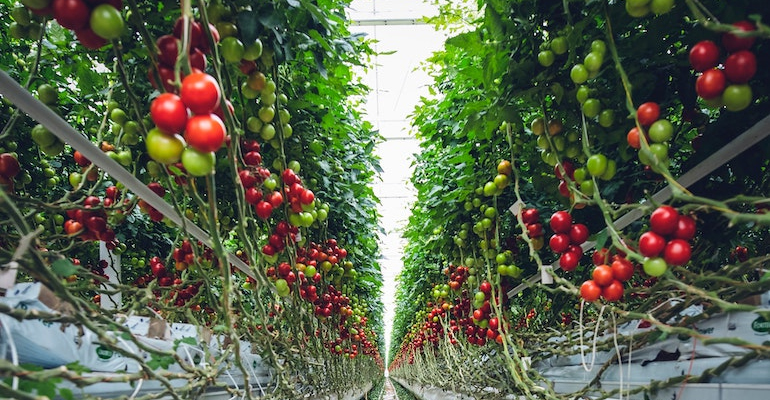News
Vertical farming reaches new heights amid climate pressures
25 Feb 2022
Traditional agricultural practices have come into question as consumers become increasingly aware of the link between their carbon footprint and their eating habits. The global farming system is responsible for between 25% and 39% of total greenhouse gas emissions, according to environmental non-profit WWF. To help combat this relationship, vertical farming has positioned itself as a solution to feed the growing population while lowering humanity’s agricultural-related carbon footprint.
Vertical farming is a system that allows for the cultivation of crops in a controlled environment, and this lack of weather variations and pests provides for crops to be grown at a variety of latitudes. This modern farming system also significantly reduces the amount of water and arable land required to produce fruits and vegetables. Furthermore, due to the flexibility of location that these controlled environments provide, vertical farming facilities also can be close to cities, thereby reducing the number of resources expended on transportation and refrigeration.

With the United Nations predicting the global population is set to reach nearly 10 billion people in 2050 and the arable land that is suitable for farming dwindling as a result of climate change, vertical farming has attracted a significant amount of attention as a possible solution to feed the world’s population. Despite the advantages vertical farming presents, there are nevertheless shortcomings associated with these systems, including high energy costs and interruption of produce seasonality.
Even so, the future prospects of this agricultural model have attracted investors, becoming one of the most popular destinations for investment capital in recent years. Almost $1.9 billion poured into the segment in 2020, and this funding was nearly triple what was invested globally in 2019, according to PitchBook data cited by Reuters. Nor is it just CPG companies that are interested in supporting these farms. Fidelity Management & Research Company led a $300 million (€264.3 million) for Bowery Farming last year. Germany’s Bayer backed a new company called Unfold through its investment arm. And General Atlantic and Siemens Financial Services similarly invested in the space, leading a $160 million (€140.9 million) round for 80 Acres Farms.
Many vertical farming operations remain localized, but some are also looking to expand their industrial scales. Kalera AS acquired all the shares for Germany’s &ever indoor farm, which has operations for its baby leafy greens in the Middle East, Asia and Europe.
Greens are a popular product to hail from vertical farms, but hundreds of different crops can be farmed in these climate-controlled operations. However, there are some crops, like cocoa, for which vertical farming presents an immediate opportunity due to the strains of climate change that are already affecting yields. The ability to insulate such valuable crops from the effects of climate change has attracted attention and investment. Last year, the multinational Cargill entered into a multi-year research agreement with AeroFarms to use vertical farming practices to improve cocoa bean yields and develop more climate-resilient farming practices.
“Environmental challenges and growing demand for cocoa products are placing increased pressure on the global cocoa supply chain,” Niels Boetje, managing director Cargill Cocoa Europe said in a statement. “We are collaborating across sectors in bold experiments to bring greater productivity and resiliency to traditional cocoa farming operations.”
Agriculture is likely to remain under the microscope for its contribution to global greenhouse gasses. As a result, vertical farming has a long growth trajectory as the world works to provide food while adhering to global climate change goals that were recently reiterated at last year’s Glasgow climate summit. “At COP26, governments recognized that soil and nutrient management practices and the optimal use of nutrients lie at the core of climate-resilient, sustainable food production systems and can contribute to global food security,” said UN Climate Change in a statement.
Related news

Oat Barista: Innovation for game-changing beverages
20 Nov 2025
Oat Barista is a clean label, sustainable, and innovative drink base specifically designed to create the perfect foam in one single ingredient.
Read more
Nitrites: Pressure grows on UK to follow EU’s lead
20 Nov 2025
Pressure is growing on the UK to follow the EU’s lead after the bloc revised its regulations on the permitted levels of nitrites and nitrates in cured meats.
Read more
Empowering innovation in fortification and colouration
13 Nov 2025
Divi’s Nutraceuticals offers a large portfolio of innovative, high-quality ingredients for foods, beverages, and supplements, with bespoke solutions and expert support for product success.
Read more
Danone highlights digestive health as potential ‘tipping point’ for food industry
13 Nov 2025
Danone is betting on a food industry “tipping point” that will bloat the market for healthy products, particularly those related to gut health.
Read more
Standing Ovation and Bel scale up casein production from dairy co-products
11 Nov 2025
Foodtech company Standing Ovation has partnered with cheese specialist Bel Group to manufacture dairy serums for industrial-scale casein production via precision fermentation.
Read more
AI attraction means foodtech startups must ‘prove’ rather than ‘promise’
4 Nov 2025
Reports suggest that artificial intelligence (AI) is sucking investment from foodtech and agritech, but investors say the picture is complicated.
Read more
Will postbiotics become the go-to functional ingredient?
3 Nov 2025
Postbiotics show significant promise for the functional foods market due to their safety profile and beneficial bioactive properties, research suggests.
Read more
Meet the finalists of the Fi Europe Innovation Awards 2025
31 Oct 2025
Who made it to the shortlist of the Fi Europe Innovation Awards 2025? Read about the 23 companies making food and drink products healthier and manufacturing processes more efficient.
Read more
Penguin and Club bars no longer classed as chocolate
30 Oct 2025
Penguin and Club bars can no longer be classified as chocolate after the pladis-owned McVitie’s brands turned to cheaper alternatives amid the ongoing cocoa crisis.
Read more
Shorter drying time, sweeter success!
30 Oct 2025
Curious about cost-effective, sustainable and delicious candy making? Stefan Wessel reveals how Avebe’s solutions reduce drying time and energy use by up to 50%.
Read more